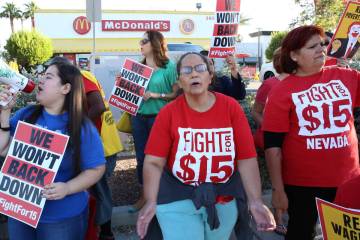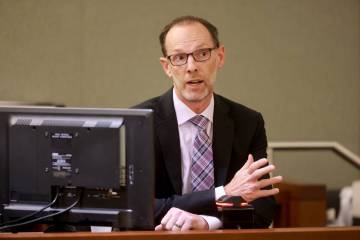Las Vegas wise to plan for a future downturn
Too many government officials budget as if the nation’s strong economy will go on indefinitely. That’s why it’s worth applauding the city of Las Vegas for taking proactive steps to save money.
Last week, the city announced it would hold open around 85 nonessential jobs. As the Review-Journal’s Shea Johnson reported, city officials estimated the move would save $10 million a year. It’s worth noting that this means the average compensation of those “nonessential” jobs is more than $115,000 a year. Only in government would you have dozens of nonessential jobs paying six figures, including benefits. No wonder government officials at all levels constantly claim they don’t have enough money.
If city officials eliminated these positions, they would wipe out their projected structural deficit, which is estimated to be $7.5 million in 2020.
But at least the city of is exercising some degree of fiscal restraint.
Las Vegas Chief Financial Officer Gary Ameling said officials decided to institute the hiring freeze after realizing “that we did not want to get in the situation that we were 10 years ago.” In the depths of the Great Recession, the city laid off 200 employees in one day.
Las Vegas officials have also boosted the city’s emergency fund. The city has $132 million in reserves, which is about 20 percent of its general fund budget. Mr. Ameling said that is “about where we think we should be.”
Unfortunately, it’s not where some legislative Democrats think it should be. State law currently protects from collective bargaining a local government’s ending fund balance up to 25 percent of its budget. That law doesn’t apply to school districts.
This is vital thanks to the legal intricacies of collective bargaining. If a local government and union can’t reach a deal, the dispute goes to an unelected and unaccountable arbitrator. Per state law, the arbitrator must consider an agency’s “ability to pay.” That means local governments can have only modest emergency funds — if they save too much money, it makes it easier for unions to demand and win larger pay hikes.
This problem would be exacerbated by Senate Bill 111, introduced last week by the Senate Government Affairs Committee. The bill would reduce the protected ending fund balance from 25 percent to 16.67 percent. If the proposal becomes law, Las Vegas municipal unions will point to the money the city has saved as evidence the taxpayers can afford to pay them more.
That would create two problems during a future recession: The city will have increased payroll costs and less money in its emergency fund.
SB111 deserves a quick death. State politicians should encourage, not undermine, efforts by Las Vegas and other local governments to prepare for an economic downturn.




























